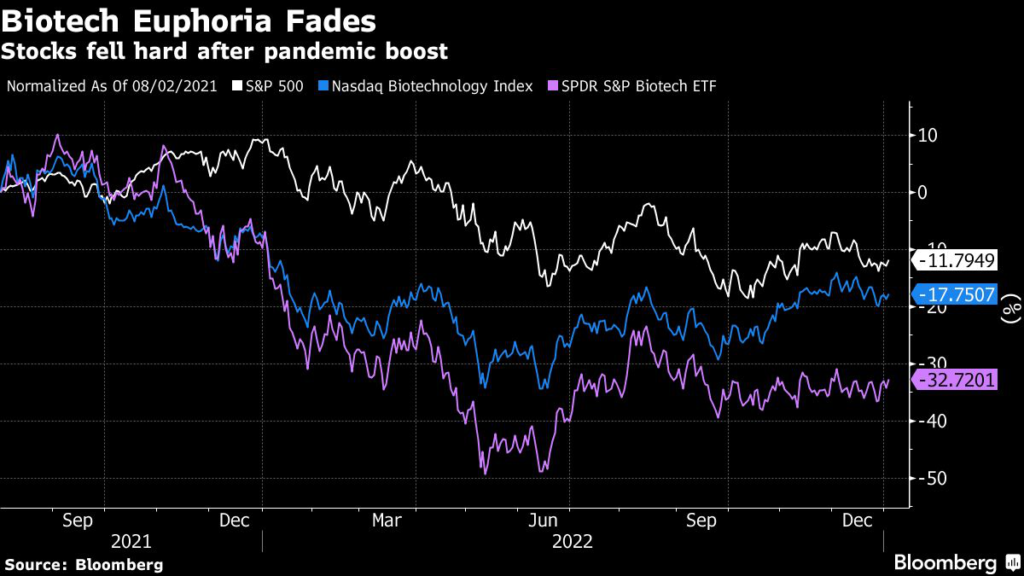In the past three years, biotech companies have enjoyed a raft of successes, including rapidly developing vaccines for Covid-19, discovering a drug that can slow the progress of Alzheimer’s disease and securing approvals for one-time gene therapies for hard-to-treat conditions.
(Bloomberg) — In the past three years, biotech companies have enjoyed a raft of successes, including rapidly developing vaccines for Covid-19, discovering a drug that can slow the progress of Alzheimer’s disease and securing approvals for one-time gene therapies for hard-to-treat conditions.
But none of that insulated the industry from the drubbing it received from Wall Street last year.
“Challenging and disappointing and depressing – you pick your negative term,” said Brad Loncar, biotech investor and chief executive officer of Loncar Investments. Last year was “the worst year from a stock market perspective that I’ve experienced in my entire career.”
Biotech and pharma giants will gather at JPMorgan’s annual healthcare meeting starting on Monday in hope of convincing investors that things can only get better. Some 48,000 people are expected to descend on San Francisco for the largest gathering of health-care industry professionals in three years. To reduce crowding, only about 8,000 will have access to the conference itself, down from about 10,000 pre-pandemic, a spokesperson said.
The week’s meeting started off with some good news for biotech as AstraZeneca Plc agreed to pay as much as $1.8 billion for CinCor Pharma Inc. to gain a treatment for hypertension and kidney disease. The upfront price of $1.3 billion is more than double CinCor’s closing price on Friday, and the maximum price is about triple.
Yet drugmakers are nervously eyeing cost-control measures in the Biden administration’s Inflation Reduction Act that some have said will force them to trim development of new, innovative products. Stocks across the board were already driven down last year by inflation and rising interest rates, while waning demand for Covid vaccines compounded the pain for health care. The SPDR S&P Biotech ETF lost 26% in 2022 and the Nasdaq Biotechnology Index fell by 11%.
As of December, 320 biotech companies had only enough cash for 1 1/2 years, and another 262 had only enough for three years — the point when companies typically start thinking about raising more money — according to Torreya Partners. Loncar said he’s talked to a number of small companies praying the market will rebound and cure their ailing stock prices, a strategy that could land them in “big, big trouble.”
Messenger RNA vaccines from Moderna Inc. and the partnership of Pfizer Inc. and BioNTech SE saved millions of lives and showed the power of biotechnology to quickly respond to a health crisis. But the Covid vaccines are a tough act to follow, and enthusiasm for the biotech industry has waned since the euphoria that sent Moderna shares up almost 25 times at their peak.
Results from a recent study showing that another Moderna mRNA product helped fight skin cancer when combined with Merck & Co.’s immune blockbuster Keytruda may signal new uses for the vaccine technology. But other companies whose products have been closely tied to the pandemic don’t have that escape hatch.
Those include Novavax Inc., maker of a Covid vaccine that gained US clearance in July, well after mRNA vaccines had saturated the market. While health officials thought the protein-based shot might be the preferred option for those who were suspicious of the newer technology in mRNA vaccines, the shots haven’t been used much, and Novavax fell 93% over last year, one of the NBI’s biggest losers. Curevac NV, another vaccine maker that enjoyed brief pandemic popularity, lost 82% for the year.
Meanwhile, higher labor and materials prices have increased the cost of doing business in the biotechnology industry. And drug companies with significant sales outside the US have been hurt by the strong dollar, while rising interest rates have negatively impacted the stock market as a whole.
There are some signs biotech stocks might start to look more attractive to investors, said Patrick Nosker, director of research at Affinity Asset Advisors. Inflation appears to be moderating and and the Federal Reserve has appeared to be less aggressive on raising interest rates.
While most biopharma names won’t regain their pandemic heights, strong companies are still being rewarded, said Christiana Bardon, co-managing partner of BioImpact Capital, a life-sciences investment firm based in Boston. For example, Madrigal Pharmaceuticals Inc.’s shares were down 25% from the beginning of the year until the company said Dec. 19 that its experimental drug for a liver disease met the goals of a late-stage clinical trial. The stock soared 268% that day and has gained another 20% since.
“This to me means that the market is still working,” she said.
What keeps some investors excited is how pace of innovation keeps moving “consistently faster with every iteration,” says Alexandra Urman, a genomics analyst at Ark Investment Management LLC. Companies with good science, good platforms and good management teams will survive the downturn, Urman said.
“There is reason to be encouraged by what we’re seeing,” she said.
–With assistance from Richard Clough.
(Updates with AstraZeneca acquisition in fifth paragraph)
More stories like this are available on bloomberg.com
©2023 Bloomberg L.P.










